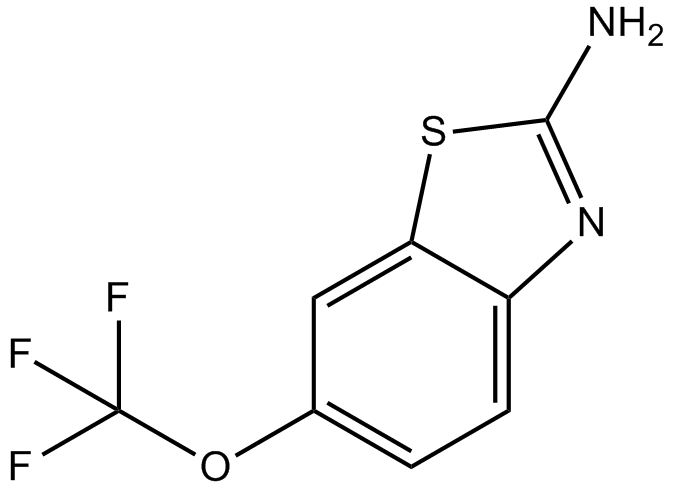Riluzole |
| Catalog No.GC13802 |
Le riluzole est un médicament anticonvulsivant et appartient À la famille des inhibiteurs des canaux Na+ dépendants de l'utilisation qui peuvent également inhiber la captation du GABA avec une IC50 de 43 μM.
Products are for research use only. Not for human use. We do not sell to patients.

Cas No.: 1744-22-5
Sample solution is provided at 25 µL, 10mM.
Riluzole, a novel glutamate-modulating agent, has neuroprotective effects [1] [2], via a complex mechanism involving inhibition of voltage-dependent Na channels, high-voltage activated Ca and K channels, and inhibition of protein kinase C. It was suggested that this mechanism was involved in antioxidative processes [3]. The IC50 to inhibit inward Na+ currents in primary cultures of rat cortical neurons is 51 μM [4].
Glutamate-mediated impairments were related to neurodegenerative diseases. Reduction of excess central nervous system (CNS) glutamate was the same aim of several treatment strategies [1] [5].
In HEKGLT1, HEKGLAST or HEKEAAC1 cells, riluzole increased Na+-dependent uptake in a dose-dependent manner, with significant effects at concentrations as low as 0.01–0.1 μM and the highest effect at 100 μM. The increase in glutamate uptake induced by 100 μM riluzole was similar in all cell lines (+27% in HEKGLAST, +38% in HEKGLT1, +39% in HEKEAAC1). Higher riluzole concentrations (300 and 1000 μM) were toxic, since at the end of experiments the majority of cells were floating, and specific and non-specific glutamate uptake were reduced by more than 50% [3].
In rat cortical synaptosomes, Na+-dependent L-[3H] glutamate uptake was increased by riluzole (0.1-100μM), a significant 16% increase was found with 100μM riluzole. With 300μM riluzole, no real effect was found on glutamate uptake. Possibly high concentration can lead to toxic effects. Both specific and non-specific glutamate uptakes were markedly reduced (about 50%) by 1 mM riluzole, at this concentration, synaptosomal integrity may be lost [3].
References:
[1]. Christiane Malgouris, Florence Bardot, Marc Daniel, et al. Riluzole, a Novel Antiglutamate, Prevents Memory Loss Hippocampal Neuronal Damage in lschemic Gerbils. The Journal of Neuroscience, 1989, 9(11): 3720-3727.
[2]. Carlos A. Zarate, Jr., Jennifer L. Payne, Jorge Quiroz, et al. An Open-Label Trial of Riluzole in Patients With Treatment-Resistant Major Depression. Am J Psychiatry, 2004, 161:171-174.
[3]. Elena Fumagalli, Marcella Funicello, Thomas Rauen, et al. Riluzole enhances the activity of glutamate transporters GLAST, GLT1 and EAAC1. European Journal of Pharmacology, 2008, 578: 171-176.
[4]. Masanori Ohashi, Akiyoshi Saitoh, Misa Yamada, et al. Riluzole in the prelimbic medial prefrontal cortex attenuates veratrine-induced anxiety-like behaviors in mice. Psychopharmacology, 2015, 232:391–398.
[5]. M. J. Hudspith. Glutamate: a role in normal brain function, anaesthesia, analgesia and CNS injury. British Journal of Anaesthesia, 1997, 78: 731-747.
Average Rating: 5 (Based on Reviews and 15 reference(s) in Google Scholar.)
GLPBIO products are for RESEARCH USE ONLY. Please make sure your review or question is research based.
Required fields are marked with *




















